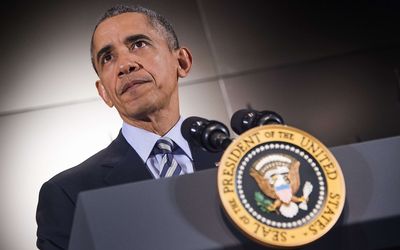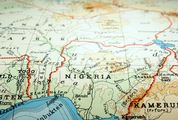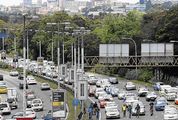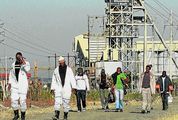NEWS ANALYSIS: US baffled at lack of progress in removing poultry barriers
by Simon Barber,
2016-01-04 06:26:41.0
US OFFICIALS say they are both frustrated and perplexed by what they see as Pretoria’s chronic failure to meet mutually agreed benchmarks to forestall the suspension of African Growth and Opportunity Act (Agoa) trade preferences that have helped SA’s farmers compete in what is still the world’s richest market.
Particularly baffling, they say, has been the optimistic statements put out by Trade and Industry Minister Rob Davies and his team declaring that the issues involved are close to resolution.
Who, they would like to know, is calling the shots and what is their agenda? The veterinarians, the politicians or both?
Ongoing bans on US poultry and beef, nominally to protect the health of South African consumers and livestock, are obliging US President Barack Obama to follow through on his November 5 threat to re-impose normal duties on SA’s farm products unless, within 60 days, Pretoria demonstrated "continual progress toward the elimination of barriers to US trade and investment". The deadline expired with the onset of this year.
The token of "continual progress" that the US most wanted was to see US chicken in South African freezers by year’s end. That benchmark was nowhere close to being met, unless, as one official caustically put it, "you think the finish line for a marathon is at mile 18".
The suspension of Agoa benefits would make SA’s citrus, macadamia nuts and wine — rising US imports that topped R2bn in 10 months of last year — less competitive in the US market. That could be especially bad news for SA’s orange growers, who will likely to have cede newly won US market share to competitors in Chile, Uruguay and Peru.
For what are they being made to pay? Notionally, Pretoria’s "zero tolerance" for salmonella-infected chicken imports and insistence that the US segregate its herds so that there is no danger that cows US cattlemen have imported from Mexico and Canada will make their way into SA’s food supply.
If it was not for Pretoria’s 15-year aversion to US chicken, SA’s Agoa privileges would likely still be intact. But the US poultry lobby packs a punch and saw its chance to prise open the South African market — more as a matter of principle than because the market is especially valuable — when Agoa came up for renewal last year.
Two senators in the lobby’s thrall, Johnny Isakson of Georgia and Chris Coons of Delaware, both otherwise well disposed to SA’s young democracy, inserted language in the new Agoa requiring the office of the US Trade Representative to undertake a special review of SA’s eligibility.
This was received favourably by colleagues who had been hearing grumbles from their own constituents and donors that while SA was by far the largest and most diversified beneficiary of Agoa, it was not the friendliest to US exports, and not just of chicken, but of beef, pork and other items.
Mr Coons and Mr Isakson gained Pretoria’s attention. At a meeting in Paris, SA agreed to rebate anti-dumping duties on up to 65,000 tonnes a year of US frozen bone-in chicken parts. Left in place, however, was SA’s blanket ban on all US poultry because of an outbreak of avian flu in the Pacific Northwest. The US said SA should follow the global norm of admitting chicken from uninfected regions.
Slow progress on this and similar health-related bans on beef and pork led the US trade office to conclude its review with a recommendation that the president put SA on the clock to "make progress" or lose preferences.
Mr Davies met US trade representative Michael Froman on the fringes of the World Trade Organisation ministerial meeting in Nairobi last month. Afterwards, the minister issued a statement that seemed to suggest all outstanding issues were close to resolution. That was not the view of the US.
Discussions between trade and veterinary officials from both sides continued until past 8pm South African time on New Year’s eve.
US Trade Representative spokesman Trevor Kincaid then provided the following readout: "On November 5 the president notified SA and Congress of his interest to suspend agricultural benefits after 60 days. We are continuing to work with SA to remove the barriers that block American poultry, beef and pork. As of today’s deadline outstanding issues have not be resolved."
The US contends SA’s demand that US chicken arrive in SA certifiably free of salmonella is not rooted in science and will deter US exporters because of the risk of shipments being denied entry when they arrive. Salmonella bacteria are commonly found in chicken and are destroyed by the simple expedient of cooking. US officials say SA’s salmonella rule is unique among the 160 countries to which the US exports chicken.
The US is equally frustrated by SA’s demand that cattle in American herds sourced from Mexico and Canada be segregated from US-born animals bound for the South African market. US officials say this is not doable.
SA’s rationale is that while Cabinet has ruled that the risk of SA importing mad cow disease from the US is negligible, similar findings have not been made with regard to US’s neighbours to its north and south.
The odds on Mr Obama being persuaded not to pull the trigger on SA’s agricultural preferences were understood to be long indeed and once he does pull it — possibly as early as Monday — normal duties on all affected items, including those currently at sea, will immediately snap into place.
Restoration of duty-free treatment will likely have to await the day when South African consumers can actually sink their teeth into an American drumstick.

Barack Obama. Picture: AFP PHOTO / JIM WATSON
US OFFICIALS say they are both frustrated and perplexed by what they see as Pretoria’s chronic failure to meet mutually agreed benchmarks to forestall the suspension of African Growth and Opportunity Act (Agoa) trade preferences that have helped SA’s farmers compete in what is still the world’s richest market.
Particularly baffling, they say, has been the optimistic statements put out by Trade and Industry Minister Rob Davies and his team declaring that the issues involved are close to resolution.
Who, they would like to know, is calling the shots and what is their agenda? The veterinarians, the politicians or both?
Ongoing bans on US poultry and beef, nominally to protect the health of South African consumers and livestock, are obliging US President Barack Obama to follow through on his November 5 threat to re-impose normal duties on SA’s farm products unless, within 60 days, Pretoria demonstrated "continual progress toward the elimination of barriers to US trade and investment". The deadline expired with the onset of this year.
The token of "continual progress" that the US most wanted was to see US chicken in South African freezers by year’s end. That benchmark was nowhere close to being met, unless, as one official caustically put it, "you think the finish line for a marathon is at mile 18".
The suspension of Agoa benefits would make SA’s citrus, macadamia nuts and wine — rising US imports that topped R2bn in 10 months of last year — less competitive in the US market. That could be especially bad news for SA’s orange growers, who will likely to have cede newly won US market share to competitors in Chile, Uruguay and Peru.
For what are they being made to pay? Notionally, Pretoria’s "zero tolerance" for salmonella-infected chicken imports and insistence that the US segregate its herds so that there is no danger that cows US cattlemen have imported from Mexico and Canada will make their way into SA’s food supply.
If it was not for Pretoria’s 15-year aversion to US chicken, SA’s Agoa privileges would likely still be intact. But the US poultry lobby packs a punch and saw its chance to prise open the South African market — more as a matter of principle than because the market is especially valuable — when Agoa came up for renewal last year.
Two senators in the lobby’s thrall, Johnny Isakson of Georgia and Chris Coons of Delaware, both otherwise well disposed to SA’s young democracy, inserted language in the new Agoa requiring the office of the US Trade Representative to undertake a special review of SA’s eligibility.
This was received favourably by colleagues who had been hearing grumbles from their own constituents and donors that while SA was by far the largest and most diversified beneficiary of Agoa, it was not the friendliest to US exports, and not just of chicken, but of beef, pork and other items.
Mr Coons and Mr Isakson gained Pretoria’s attention. At a meeting in Paris, SA agreed to rebate anti-dumping duties on up to 65,000 tonnes a year of US frozen bone-in chicken parts. Left in place, however, was SA’s blanket ban on all US poultry because of an outbreak of avian flu in the Pacific Northwest. The US said SA should follow the global norm of admitting chicken from uninfected regions.
Slow progress on this and similar health-related bans on beef and pork led the US trade office to conclude its review with a recommendation that the president put SA on the clock to "make progress" or lose preferences.
Mr Davies met US trade representative Michael Froman on the fringes of the World Trade Organisation ministerial meeting in Nairobi last month. Afterwards, the minister issued a statement that seemed to suggest all outstanding issues were close to resolution. That was not the view of the US.
Discussions between trade and veterinary officials from both sides continued until past 8pm South African time on New Year’s eve.
US Trade Representative spokesman Trevor Kincaid then provided the following readout: "On November 5 the president notified SA and Congress of his interest to suspend agricultural benefits after 60 days. We are continuing to work with SA to remove the barriers that block American poultry, beef and pork. As of today’s deadline outstanding issues have not be resolved."
The US contends SA’s demand that US chicken arrive in SA certifiably free of salmonella is not rooted in science and will deter US exporters because of the risk of shipments being denied entry when they arrive. Salmonella bacteria are commonly found in chicken and are destroyed by the simple expedient of cooking. US officials say SA’s salmonella rule is unique among the 160 countries to which the US exports chicken.
The US is equally frustrated by SA’s demand that cattle in American herds sourced from Mexico and Canada be segregated from US-born animals bound for the South African market. US officials say this is not doable.
SA’s rationale is that while Cabinet has ruled that the risk of SA importing mad cow disease from the US is negligible, similar findings have not been made with regard to US’s neighbours to its north and south.
The odds on Mr Obama being persuaded not to pull the trigger on SA’s agricultural preferences were understood to be long indeed and once he does pull it — possibly as early as Monday — normal duties on all affected items, including those currently at sea, will immediately snap into place.
Restoration of duty-free treatment will likely have to await the day when South African consumers can actually sink their teeth into an American drumstick.





















Change: -0.95%
Change: -1.26%
Change: -1.23%
Change: -0.89%
Change: -2.34%
Data supplied by Profile Data
Change: -0.39%
Change: -0.93%
Change: -0.95%
Change: 0.00%
Change: -0.99%
Data supplied by Profile Data
Change: 0.35%
Change: 0.25%
Change: 0.73%
Change: 0.58%
Change: -0.58%
Data supplied by Profile Data
Change: 0.77%
Change: 3.12%
Change: 1.50%
Change: -1.42%
Change: -5.44%
Data supplied by Profile Data